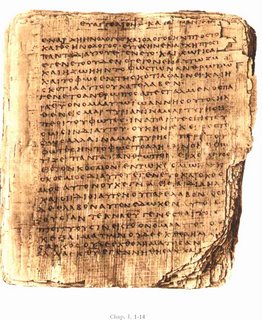
If u happen to browse around Borders at Times Square, chances are, you could find books that purport to contain "lost gospels"...
And you may find yourself confronted with questions about these books with the hype surrounding the Da Vinci Code movie and National Geographic news about the 'lost gospel of Judas' etc.
I find this article by STR quite helpful, to give an answer without having to read those gnostic books.
How is that possible?
Find out here whether there are Lost Books in the Bible?
Regardless of how you view the Scriptureas supernatural or as natural there is no sense in which there could be lost books of the Bible. If the Bible is supernaturalif God is responsible for its writing, it’s transmission, and its survivalthen God, being God, doesn’t fail. He doesn’t make mistakes, He doesn’t forget things, and He’s not constrained by man’s limitations. God can’t lose His lessons.
However, if the Bible is not supernaturalas many will contend, especially those who claim to have found lost booksone faces a different problem. By what standard do we claim these are bona fide lost books of the canon of the early church? If, from a human perspective, the Bible is that collection of writings reflecting the beliefs of early Christianity, then any writings discarded are not books of the Bible by very definition.
Has archaeology unearthed previously unknown ancient texts? Certainly. Are they interesting, noteworthy, and valuable? Some. Are they missing books of the Bible? The answer is no. Two thousand years later, the rediscovery of something like the Gospel of Thomas may be archaeologically significant. It might be a lost book of antiquity, a great find, even a wonderful piece of literature. But it is not a lost book of the Bible
Comments
So yes.. the text was authentic (actually, it's a 3rd century AD Coptic version translated from the original Greek(?))... but what of the contents, who wrote it and why it was rejected by the early church? The details in the program was sketchy at best on these points since so much time was devoted to the story of how the codex was discovered, stolen, recovered, left to rot in a bank vault, then finally found and slowly restored.
In fact, this whole discussion has many themes common to the DVC "controversy" - it's really all about how the bible was compiled, why certain texts are more trustworthy than others, how the church arrived at its orthodoxies etc. Of course, it doesn't help that we Christians generally know so little about our own history and how we came to we believe what we believe, what more the wider post-Christian society whose reaction to centuries of "Christendom" has led them to grasp at anything at all that appears to contradict mainstream Christianity.
perhaps it shows how a prevailing cynical attitude towards truth and history i.e. "that's YOUR interpretation... that's the WINNER's history" actually play into the hands of these critics.
Maybe a good that comes out of it is we christians ourselves need to be careful how far we take the postmodern critique... so that we wont shoot ourselves in the foot so to speak..
NT Wright posted a good response her:
http://www.ntwrightpage.com/sermons/Sermon_As_One_Who_Serves.htm